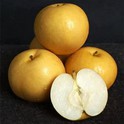Hey there! As a fresh pear supplier, I've always been super curious about all the amazing things these juicy fruits can do. One question that's popped up a lot lately is, "Do fresh pears have any antibacterial properties?" Well, let's dive right in and find out!
First off, let's talk a bit about pears. There are so many different kinds out there, each with its own unique flavor and texture. For example, the Sweet Pear is, as the name suggests, incredibly sweet. It's like a little burst of sugary goodness in your mouth. Then there's the Shinko Pear, which has a lovely, crisp texture and a slightly tart taste that balances out the sweetness. And of course, we can't forget the Fragrant Pear, which lives up to its name with a delicious, floral aroma.
Now, onto the big question: antibacterial properties. To understand if pears have them, we need to look at what they're made of. Pears are chock-full of vitamins and minerals. They're a great source of vitamin C, which is well-known for its immune-boosting properties. Vitamin C helps our bodies fight off infections and keeps our immune system in tip-top shape. It can also act as an antioxidant, which means it helps protect our cells from damage caused by free radicals.
But that's not all. Pears also contain dietary fiber. Fiber is important for our digestive health, but it can also play a role in our body's defense against bacteria. A healthy gut microbiome is crucial for overall health, and the fiber in pears can help feed the good bacteria in our gut, creating an environment that's less hospitable to bad bacteria.
Some studies have also suggested that certain compounds found in pears might have antibacterial effects. For example, pears contain polyphenols. These are natural compounds that have been shown to have antioxidant, anti-inflammatory, and yes, antibacterial properties. Polyphenols can interfere with the growth and survival of bacteria by disrupting their cell membranes or inhibiting their ability to produce energy.
One study specifically looked at the antibacterial activity of pear extracts against common foodborne pathogens like Escherichia coli and Staphylococcus aureus. The results were pretty interesting. The pear extracts were found to have some inhibitory effects on the growth of these bacteria, suggesting that pears might indeed have some natural antibacterial powers.
But it's important to note that these studies were done in a laboratory setting. In real life, the antibacterial effects of pears might be a bit more complicated. Eating a pear isn't going to be a magic bullet for getting rid of all bacteria in your body. However, incorporating pears into a balanced diet can definitely contribute to your overall health and potentially help your body fight off infections.
So, if you're looking to boost your immune system and keep those pesky bacteria at bay, adding some fresh pears to your diet is a great idea. You can eat them on their own as a snack, add them to salads for a sweet and crunchy twist, or even use them in baking. A warm, freshly baked pear pie is not only delicious but might also be doing your body some good!
As a fresh pear supplier, I'm always excited to share the benefits of these amazing fruits. Whether you're a health-conscious consumer or a chef looking for new ingredients to play with, our pears are of the highest quality. We source our pears from the best orchards, making sure they're ripe, juicy, and full of flavor.
If you're interested in purchasing fresh pears for your home, restaurant, or business, I'd love to have a chat with you. We can discuss your needs, the different varieties available, and how we can get the perfect pears to you. Whether you need a small batch for your family or a large order for your establishment, we've got you covered.


In conclusion, while pears might not be a cure-all for bacterial infections, they do have some potential antibacterial properties thanks to their vitamins, minerals, fiber, and polyphenols. So, go ahead and enjoy a pear today. Your taste buds and your body will thank you!
References
- "Antioxidant and Antimicrobial Activities of Pear (Pyrus communis L.) Extracts" - Journal of Food Science
- "The Role of Vitamin C in Immunity" - Nutrients Journal
- "Dietary Fiber and Gut Microbiota in Health and Disease" - Frontiers in Nutrition





